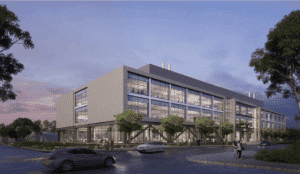
The continuing wave of life science redevelopment projects in West Cambridge includes The Davis Cos.’ proposed 142,000-square-foot office-lab building at 109 Smith Place. Image courtesy of Jacobs
The land rush at Cambridge’s final development frontier shows no sign of abating, and city officials hope to leverage private investment into public benefits including new transit connections and park space.
Even before Greater Boston’s newest major life science player completes its expected $125 million acquisition of the 26-acre GCP Applied Technologies campus in Alewife this month, residents and elected officials are dusting off their wish lists that could be tied to its redevelopment.
“This really is what Kendall Square was 30 years ago: a bunch of parking lots and a few manufacturing facilities, and it is the place in the city where we’re going to be able to have the most development,” City Councilor Patricia Nolan said.
Cambridge councilors see the change of ownership as a potential catalyst to restore the 9-acre Jerry’s Pond section of the GCP property, decades after the former swimming hole was closed to the public. As-yet-undisclosed redevelopment plans by IQHQ could benefit from incentives being debated by city officials, such as giving developers height and density bonuses in exchange for creating parks and setting aside open space.
Alewife Rents Near $75 PSF
Alewife’s access to the MBTA’s Red Line and the cachet a Cambridge address gives companies have been a winning combination in recent years for Boston developers including King Street Properties and The Davis Cos., both of which have lured a series of biotech firms to redeveloped office-lab buildings. Asking lab rents in Alewife are approaching levels seen in Kendall Square just a few years ago, with landlords seeking over $75 per square foot on a triple-net basis, according to a recent CBRE report.
After selling its speculative Alewife Research Center development for $332.5 million, The Davis Cos. is looking to replicate its success with a new lab building proposed for 109 Smith Place. The plans call for 142,000 square feet of office and lab space across 3 stories, replacing a pair of warehouses.
Another developer – Boston-based Cabot, Cabot & Forbes – is offering transportation upgrades as part of a proposed 1 million-square-foot redevelopment of the 12-acre former Mabardy Washed Sand and Gravel property on Mooney Street. The 145-foot-long bridge spanning the MBTA tracks to Cambridgepark Drive would make the 130-acre Quad area more accessible to public transit riders as the district adds new office and lab space to its existing multifamily and industrial uses.
The bridge is being offered by CC&F as a trade-off for zoning changes allowing commercial building heights up to 85 feet. The firm is proposing three office-lab buildings and three multifamily buildings.
CC&F CEO Jay Doherty said the additional height would enable the development to include unique ground-floor tenants such as Central Rock Gym and a brewpub that require 20-foot ceiling heights.
“We can only afford it if we have the height. It’s hard to surrender 2 stories of lab for a non-market paying ground floor use,” Doherty said. “They pay maybe $20 to $40 [per square foot] on a good day, so you have to offer a subsidy to get them.”
Density Bonuses for Public Improvements?
The first wave of redevelopment coming out of the recession transformed Cambridgepark Drive, the real estate closest to the Alewife MBTA station, replacing decades-old commercial buildings with apartment complexes totaling nearly 1,400 units. The next round of acquisitions has clustered in the Quad section located across the railroad tracks, which was occupied by steel fabricators, brickyards and factories in the early 20th century and more recently warehouse and R&D uses.
The city’s Alewife District Plan lays out the potential for future growth, and opportunities to connect a mishmash of disconnected land uses including strip malls, apartment buildings, industrial remnants and office-lab facilities. Still under review by Cambridge officials, the document suggests that developers be given density bonuses for community benefits such as public open space.
The report identifies the Whittemore Avenue district which includes the new IQHQ property as an opportunity for public realm upgrades and recommends giving developers density bonuses in exchange for creation of park and open space around Jerry’s Pond.
Located on the IQHQ property, the pond has been off-limits to the public since the 1960s, and is contaminated with asbestos, petroleum and naphthalene, according to city officials. GCP Applied Technologies, which makes additives for construction materials, is a former subsidiary of W.R. Grace Co. and was spun off as a publicly traded company in 2016.
In a policy order approved last week, the City Council instructed City Manager Louis DePasquale to contact the new owners about future restoration of the pond property and new connections to nearby transit and parklands.
“Whatever happens, the city will be asking the development team to integrate that open space back into the community,” City Councilor Dennis Carlone said in an interview.

Steve Adams
Although IQHQ has specialized in life science property acquisitions and developments since entering the Greater Boston market last year, Cambridge officials will expect any redevelopment of the Whittemore Avenue property include approximately 40 percent housing, Carlone said.
“If you ask all the residents, they all want housing, not labs per se or offices,” he said. “It’s housing, housing and housing and we have to address that citywide.”
In a statement provided to Banker & Tradesman, IQHQ said it “plans to look at the Alewife Park site closely and engage with all relevant parties.”




 |
| 
